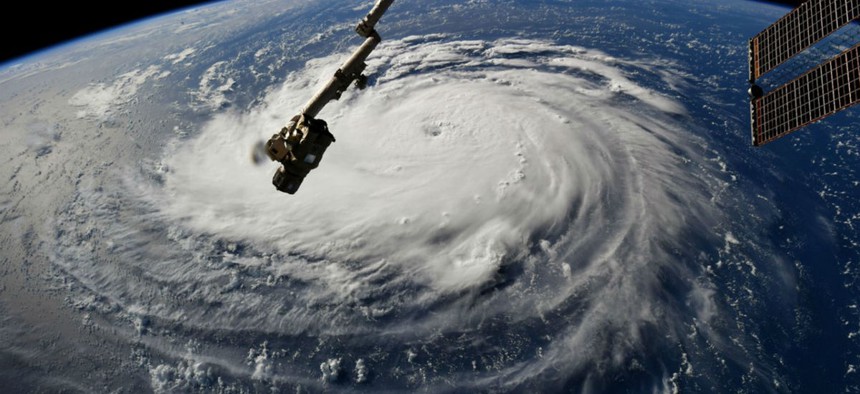
Astronaut Ricky Arnold, from aboard the International Space Station, shared this image of Hurricane Florence on Sept. 10. NASA
Evacuations, Closures and Leave: How Federal Agencies Are Preparing for Hurricane Florence
FEMA is leading the response, but an array of agencies are set to get caught in Florence's path.
Several federal agencies with a footprint in the path of Hurricane Florence are preparing for the storm, including by relocating resources, finding alternative work sites for staff and closing facilities.
Florence is approaching the East Coast as a Category 4 hurricane and is expected to make landfall in the Carolinas on Thursday. The Federal Emergency Management Agency is leading the preparations for and response to the storm, but several other agencies are likely to get caught up in its wake. President Trump has already granted emergency declarations for South Carolina, North Carolina and Virginia.
“We are totally prepared,” Trump said Tuesday. “We are ready as anybody has ever been.”
FEMA tapped Albert Lewis and Elizabeth Turner as its federal coordinating officers in the Carolinas, and activated a 24/7 Regional Response Coordination Center. The agency has Incident Support Bases at North Field, S.C., and Fort Bragg, N.C., where it has prepositioned nearly 800,000 liters of water, 1 million meals, 1,200 cots and 55 generators. Other deployed assets include Mobile Emergency Response Support to provide telecommunications and logistics; 15 urban search and rescue teams; a “hurricane liaison team” of federal, state and local emergency managers; four Disaster Medical Assistance Teams in Charlotte, made up of medical personnel; and two Defense Department Coordinating Elements to orchestrate military support.
Several other Defense installations were forced to take preparations. Joint Base Charleston in South Carolina issued a “limited evacuation order” for both uniformed service members and civilian employees who live in the area. Only those assigned to “hurricane ride-out teams” must remain on the base. U.S. Fleet Forces Command in the Hampton Roads area of Virginia sent out to sea nearly 30 ships in a process known as sortie.
“Our ships can better weather storms of this magnitude when they are underway,” U.S. Fleet Forces Commander Adm. Christopher Grady said in a statement. The Navy has instructed military and civilian personnel and their families to in the area to evacuate. Installations there have begun removing debris from drainage areas, sand-bagging flood zones and fueling up generators and government vehicles, among other steps.
Marine Corps Air Station Beaufort in South Carolina on Tuesday ordered a mandatory evacuation of all non-essential Defense personnel. Marine Corps Base Camp Lejeune in North Carolina released all non-essential personnel from duty and placed all government employees in administrative leave status until Monday, Sept. 17. It also activated emergency shelters on base and opened them up to families, who should arrive with enough food and water for three days.
Several civilian agencies are also taking precautions:
- The Housing and Urban Development Department closed its offices in Columbia, S.C., and Greensboro, N.C.
- The Veterans Affairs Department canceled all outpatient appointments at the VA Medical Center in Charleston and its clinics in Goose Creek, Beaufort, Myrtle Beach and the Trident Annex through Saturday. Inpatient care will continue, though volunteers have been told not to report for duty. Several other outpatient clinics in the Carolinas are closed.
- The Equal Employment Opportunity Commission’s office in Norfolk, Va., is under mandatory evacuation order and has closed. Its offices in Richmond, Va., as well as Charlotte, Greensboro, Greenville, and Raleigh, N.C., are also closed.
- The Small Business Administration has established alternative work sites for South Carolina employees in North Charleston, and for North Carolina employees in Wilmington. Some workers on the coast are teleworking further inland, while the agency has a crisis communications plan in place for other staffers. “SBA always recognizes that the safety of its personnel is the primary concern,” a spokeswoman said.







